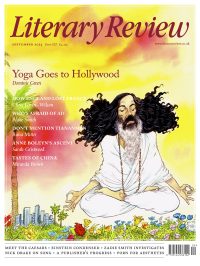David Pryce-Jones
Socialism & Psychoanalysis
Vienna: How the City of Ideas Created the Modern World
By Richard Cockett
Yale University Press 464pp £25
Vienna is a handbook, a sort of Who Was Who for that city from the last decades of Habsburg rule up to the present. Richard Cockett, a senior editor at The Economist and a historian, makes no concessions to fashion. There are none of the usual pot-boiler themes such as aristocracy, Johann Strauss father and son, the ethno-nationalism of the several minorities, Gemütlichkeit and all the rest of it. Instead, there are many hundreds of names, some of them famous and deserving of a few pages to explain why, some of them known only by those in their field and therefore rating merely a paragraph or two, the whole lot serving the purpose of establishing that Vienna was the city where the modern world was formed. Generalisations come thick and fast.
Bildung, which means self-cultivation (though mostly in the sense of being properly educated), is described here as ‘the central intellectual framework for the Viennese bourgeoisie and the Habsburg monarchy’. In his autobiography, Life and Shape (1962), the architect Richard Neutra describes his elder brothers’ book-filled living quarters. A glass case contained a multi-volume encyclopedia in which, he was told, he could find ‘everything there was to be known in the world’. They also had busts of Mozart and Beethoven, Goethe and Schiller. This quartet, writes Cockett, was ‘held to enshrine through their poetry, prose and music a universal order, secular, rational and liberal’. Similarly, Karl Przibram, a physicist, recalled that the dominant spirit in his parents’ home was ‘that of the educated Jewish bourgeoisie of the liberal era, with its unconditional faith in progress and its open-mindedness for all achievements in art and science’.
Defeat in the First World War and the collapse of the currency put an end to the idealistic notion of Bildung. Far from seeing anything like a universal order, Stefan Zweig described in The World of Yesterday (1943) how when he went into the city he saw ‘in the yellow,

Sign Up to our newsletter
Receive free articles, highlights from the archive, news, details of prizes, and much more.@Lit_Review
Follow Literary Review on Twitter
Twitter Feed
It wasn’t until 1825 that Pepys’s diary became available for the first time. How it was eventually decrypted and published is a story of subterfuge and duplicity.
Kate Loveman tells the tale.
Kate Loveman - Publishing Pepys
Kate Loveman: Publishing Pepys
literaryreview.co.uk
Arthur Christopher Benson was a pillar of the Edwardian establishment. He was supremely well connected. As his newly published diaries reveal, he was also riotously indiscreet.
Piers Brendon compares Benson’s journals to others from the 20th century.
Piers Brendon - Land of Dopes & Tories
Piers Brendon: Land of Dopes & Tories - The Benson Diaries: Selections from the Diary of Arthur Christopher Benson by Eamon Duffy & Ronald Hyam (edd)
literaryreview.co.uk
Of the siblings Gwen and Augustus John, it is Augustus who has commanded most attention from collectors and connoisseurs.
Was he really the finer artist, asks Tanya Harrod, or is it time Gwen emerged from her brother’s shadow?
Tanya Harrod - Cut from the Same Canvas
Tanya Harrod: Cut from the Same Canvas - Artists, Siblings, Visionaries: The Lives and Loves of Gwen and Augustus John by Judith Mackrell
literaryreview.co.uk